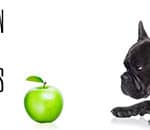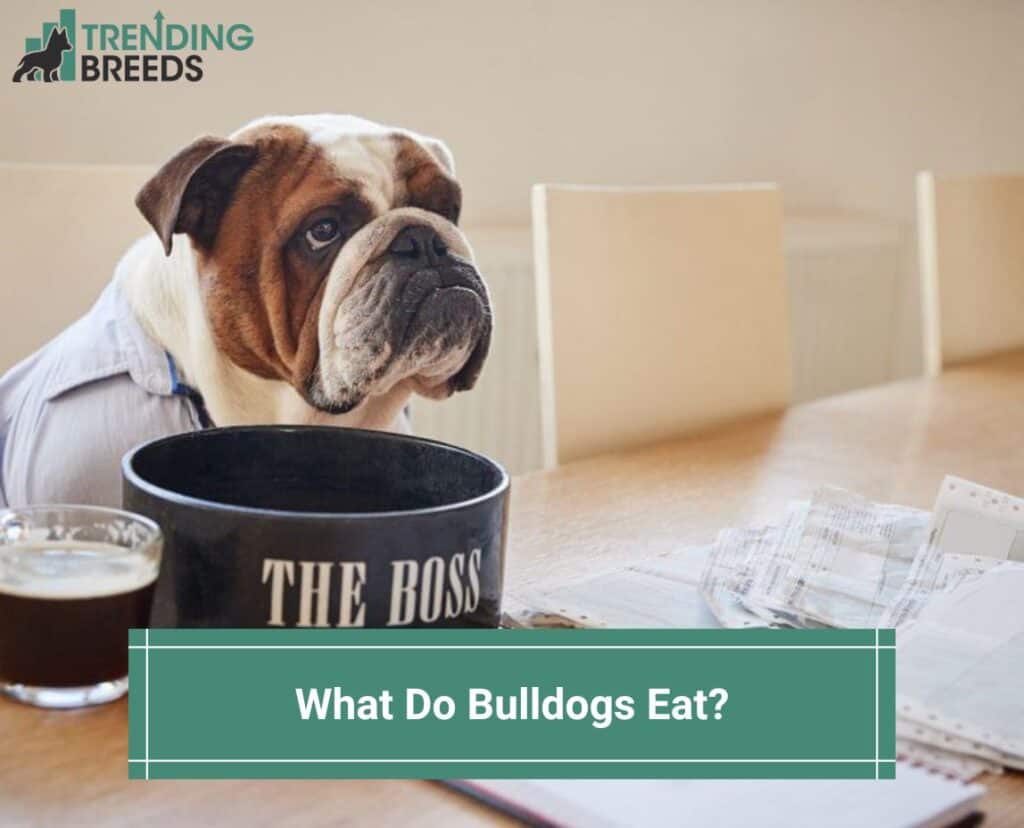
Today we are going to talk about what Bulldogs eat. Bulldogs love to eat and because they are short and stout, they can easily become obese if they are not fed properly.
Bulldogs need a diet that is balanced and has all the vitamins and minerals they need to stay healthy.
Other articles you would like: Best Pet Insurance For French Bulldog and Best Food For French Bulldog Puppies & Adults
Table of Contents
What Do Bulldogs Eat
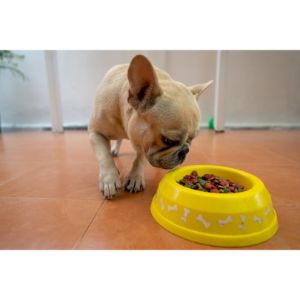
Dog foods are made to provide your bulldog with all the nutrients they need.
If you need some guidance choosing the right foods for your bulldog or want to ensure the food you are feeding your bulldog is adequate, be sure to keep these points in mind to help keep your dog healthy.
What Are The Nutritional Requirements Of Bulldogs?
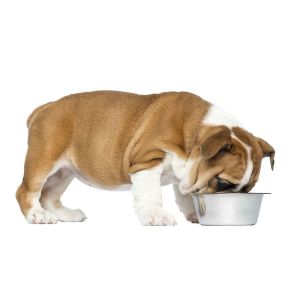
Bulldogs have specific nutritional needs just like any other living thing. If you have a bulldog or are thinking about getting one, it’s essential to understand their needs.
Feeding your bulldog a well-balanced diet that meets their nutritional needs will ensure your dog lives a long and happy life.
Protein
Dogs can have meals with 2 grams of protein, omega-6 fatty acids, and carbohydrates rich in minerals and vitamins, depending on their size. Your bulldog must first be measured in pounds, so if it weighs 50 pounds, it must be given 100 grams of protein.
Make sure the dog food you give them contains enough protein.
To maintain good health, English bulldogs require a diet that contains both plant and animal proteins. In addition to strengthening bones and muscles, proteins also promote hair and nail growth.
Dogs also produce hormones and antibodies through protein, making them energetic.
It is recommended that English bulldog puppies and pregnant bulldogs consume twice as much protein per pound as their adult counterparts. Lamb is a good source of protein for your bulldog.
Your bulldog may suffer from mild allergic reactions such as losing fur or being extra itchy when eating chicken.
You should immediately check the ingredients for chicken if you notice these reactions. Make sure your dog’s food does not contain chicken. Protein can also be found in eggs.
In addition to strengthening your bulldog’s bones, eggs promote healthy skin. You should avoid giving raw eggs to your bulldogs, however, as salmonella can become a problem.
Vitamins and Minerals
Bulldogs are our family members, and we want the best for them at all times. Providing your bulldog with the right vitamins and minerals is very important for his health. As a result, they boost the immune system.
The antioxidant properties of vitamins help the blood clot. Vitamins A, C, K, E, and folate are the most important vitamins to give your bulldog. Fat-soluble vitamins can be toxic for your bulldog, so don’t feed them to him.
Minerals are important for the healing of wounds and for regulating bone and tooth growth.
Selenium, iron, zinc, calcium, magnesium, sodium, and potassium are all essential minerals. Vitamins and minerals are plentiful in whole grains, and fiber is good for digestion.
As well as lowering the risk of obesity, heart disease, high cholesterol, and kidney disease, whole grains also help you lose weight.
The banana is at the top of the list when it comes to fruits. The vitamins C, magnesium, potassium, and B6 in bananas are beneficial to the bones, as well as aid digestion.
However, do not overfeed your bulldog. Too many bananas can upset the stomach of your bulldog, causing them to become fat. To keep them healthy, you should always feed them moderately.
The same goes for strawberries. Dogs benefit from strawberries because of their high sugar content and antioxidant content. Some nuts are okay for bulldogs.
A large number of nuts can cause your dog to become fat if consumed in large amounts, as they contain protein and Omega 3 fatty acids. Other vitamins are important as well.
Studies have shown that a bulldog’s overall health can be improved by taking advantage of a host of other minerals not previously considered in bulldog food.
Your bulldog needs to consume a variety of minerals, including iron, selenium, magnesium, sodium, zinc, and potassium.
You can use each one for different purposes, including healing wounds, facilitating nerve transmission, and promoting healthy bones and teeth. Shellfish, such as oysters, and other mineral-rich foods should be a part of your dog’s diet.
A dog’s diet should include vitamins as well as minerals. Vitamins are an important component of the best foods for bulldogs. Excellent health requires these vitamins.
Bulldogs’ bodies use these nutrients to boost their immune system, aid in healing, and maintain their health, blood clotting and working as antioxidants.
In addition to vitamins A, C, E, K, and folate, you should also give your bulldog supplements. Dogs can be poisoned by fat-soluble vitamins if added on their own.
Carbohydrates
In addition to carbohydrates, your bulldogs need to be provided with a balanced diet. As well as containing a lot of vitamins and minerals, carbohydrates keep your bulldogs active.
Your bulldogs also benefit from fats by providing energy, flawless skin, and a smooth coat. A healthy nervous system and a proper body temperature are also possible benefits of providing fats to your bulldogs.
Some people claim that bulldogs should avoid carbohydrates, but this could not be further from the truth. For a bulldog to function properly and to have the best energy supply, the best foods for him must contain carbohydrates.
Carbohydrates provide the body with the energy it needs to function properly. A carbohydrate also provides a host of health benefits by containing vitamins, minerals, and antioxidants.
How Much Should a Bulldog Weigh?

English Bulldogs weigh 50-60 pounds and stand 14-16 inches tall at full grown. English Bulldog females weigh between 40 and 44 pounds at full maturity and stand 12 to 14 inches tall.
The ideal weight for a female bulldog is 48 to 50 pounds, and the ideal weight for a male bulldog is 52 to 55 pounds.
In general, Frenchies are relatively small when they are full-grown. A male dog is usually between 20 and 28 pounds, while a female is usually between 17 and 26 pounds.
There will, of course, be variance between the two sizes, but on average, males weigh between 20 and 28 pounds, and females weigh between 17 and 26 pounds. There is no better vacuum for pets than bulldogs!
Nevertheless, if a bulldog does not receive a nutritious diet that meets its specific health needs, it will become obese and lazy.
Can Bulldogs Eat Human Food?
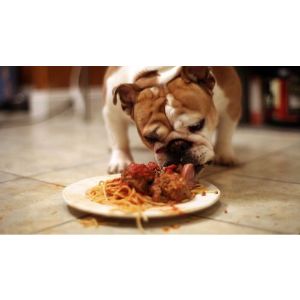
Human food and table scraps are often fed to dogs by their owners. Your dog loves you, and you enjoy seeing it happy when it gets a mouthwatering treat. It is not recommended to feed dogs human food.
Some dogs will eat anything and everything, even things that are technically not edible, so you might not think of them as picky eaters. It should be noted, however, that some dogs can certainly be picky eaters.
Likewise, dogs and humans both prefer different types of food. This often isn’t a major issue for dogs that are only fed kibbles or wet food.
The only food they know is their own, and maybe a few dogs treats. They will eat dog food if it’s the only thing they know, if only for the simple reason that they’re hungry and are unaware of human food.
Nevertheless, if you start giving your dog various foods that are meant for humans and table scraps, it will change the way you think about food. A dog’s full training takes a long time, as any dog owner knows.
Many dogs take months or even years to learn simple commands such as sit, lay down, stay, come, and a few others. Giving your dog human food will ruin all of that good behavior and training. Are you sure you want to do that?
This is precisely what will happen. Dogs have bad habits, just like humans, and feeding them human food will introduce them to them.
You will see a change in your dog’s behavior once you start feeding them human food. Therefore, your dog will become a kitchen companion.
Most human foods don’t work for dogs, and that’s the real problem. Did you know that chocolate can kill dogs? This isn’t a myth.
Chocolate can be eaten by some dogs without getting ill, while other dogs might get ill, and some might even die.
In addition, certain human foods can have serious health consequences for dogs, including garlic, onions, nuts, dairy products, and a wide variety of other foods.
Certain foods can make your dog dizzy or drowsy and cause diarrhea or upset stomachs. Some can make your dog vomit and even cause kidney failure, seizures, or death.
You should feed your dog real meats such as beef, pork, chicken, and fish, as well as yogurt if you plan on feeding him human food. Peanut butter can also be fed to dogs in moderation as a treat.
You will also like:
- Best Harnesses For French Bulldogs
- How Long Do English Bulldogs Live
- How Many Puppies Do English Bulldogs Have?
For more information about the Bulldog nutrition, check out the video below:



